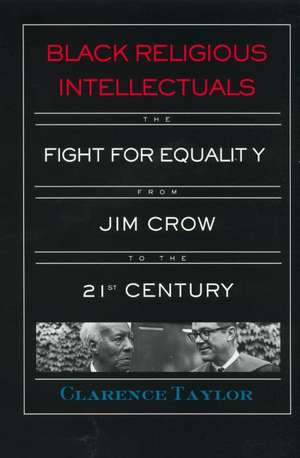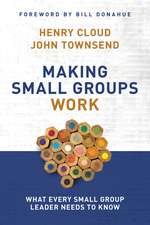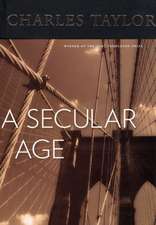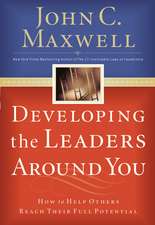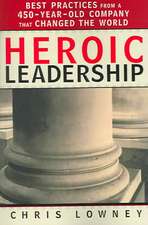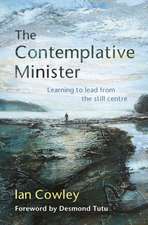Black Religious Intellectuals: The Fight for Equality from Jim Crow to the 21st Century: Crosscurrents in African American History
Autor Clarence Tayloren Limba Engleză Paperback – 20 sep 2002
| Toate formatele și edițiile | Preț | Express |
|---|---|---|
| Paperback (1) | 357.18 lei 6-8 săpt. | |
| Taylor & Francis – 20 sep 2002 | 357.18 lei 6-8 săpt. | |
| Hardback (1) | 1006.07 lei 6-8 săpt. | |
| Taylor & Francis – 20 sep 2002 | 1006.07 lei 6-8 săpt. |
Din seria Crosscurrents in African American History
-
 Preț: 311.70 lei
Preț: 311.70 lei -
 Preț: 354.87 lei
Preț: 354.87 lei -
 Preț: 432.29 lei
Preț: 432.29 lei -
 Preț: 367.83 lei
Preț: 367.83 lei -
 Preț: 278.13 lei
Preț: 278.13 lei -
 Preț: 485.40 lei
Preț: 485.40 lei -
 Preț: 481.58 lei
Preț: 481.58 lei -
 Preț: 354.72 lei
Preț: 354.72 lei -
 Preț: 486.38 lei
Preț: 486.38 lei -
 Preț: 436.14 lei
Preț: 436.14 lei -
 Preț: 284.52 lei
Preț: 284.52 lei -
 Preț: 443.65 lei
Preț: 443.65 lei - 18%
 Preț: 1010.95 lei
Preț: 1010.95 lei -
 Preț: 432.87 lei
Preț: 432.87 lei
Preț: 357.18 lei
Nou
Puncte Express: 536
Preț estimativ în valută:
68.35€ • 70.96$ • 56.100£
68.35€ • 70.96$ • 56.100£
Carte tipărită la comandă
Livrare economică 24 martie-07 aprilie
Preluare comenzi: 021 569.72.76
Specificații
ISBN-13: 9780415933278
ISBN-10: 0415933277
Pagini: 248
Dimensiuni: 152 x 229 x 19 mm
Greutate: 0.47 kg
Ediția:1
Editura: Taylor & Francis
Colecția Routledge
Seria Crosscurrents in African American History
Locul publicării:Oxford, United Kingdom
ISBN-10: 0415933277
Pagini: 248
Dimensiuni: 152 x 229 x 19 mm
Greutate: 0.47 kg
Ediția:1
Editura: Taylor & Francis
Colecția Routledge
Seria Crosscurrents in African American History
Locul publicării:Oxford, United Kingdom
Notă biografică
Clarence Taylor is Professor of History and African New World Studies at Florida International University. He is the author of The Black Churches of Brooklyn and Knocking at Our Door: Milton A. Galamison and the Struggle to Integrate New York City Schools, and co-edited with Jonathan Birnbaum Civil Rights since 1787: A Reader on the Black Struggle.
Recenzii
"Men and women of god, religious institutions, faith, and spiritual symbolism have been a constant presence within the political struggles of black America. Using the intellectual biographies of a wide range of twentieth century leaders, Clarence Taylor exposes the kinship between African-American religious and secular traditions. With sensitive treatments of gender, race, and class, Taylor identifies religion as a medium of empowerment. Black Religious Intellectuals will excite a new conversation about the heterogenous religious currents in African-American intellectualism." -- Craig Steven Wilder, Professor of History, Dartmouth
Cuprins
Collegeowledgements Introduction Black Intellectuals: A More Inclusive Perspective Chapter 1. Sticking to the Ship: Manhood, Fraternity, and the Religious World View of A. Philip Randolph Chapter 2. Expanding the Boundaries of Politics: The Various Voices of the Black Religious Community of Brooklyn, New York Before and During the Cold War Chapter 3. The Pentecostal Preacher as Public Intellectual and Activist: The Extraordinary Leadership of Bishop Smallwood Williams Chapter 4. The Reverend John Culmer and The Politics of Black Representation in Miami, Florida Chapter 5. The Reverend Theodore Gibson and the Significance of Cold War Liberalism in the Fight for Citizenship Chapter 6. A Natural Born Leader: The Politics of the Rev. Al Sharpton Chapter 7. The Evolving Spiritual and Political Leadership of Louis Farrakhan: From Allah's Masculine Warrior to Ecumenical Sage Chapter 8. Ella Baker, Pauli Murray, and The Challenge to Male Patriarchy Notes Bibliography
